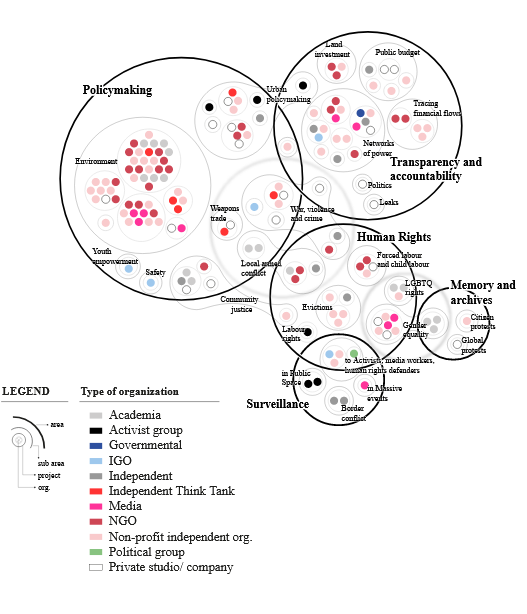In today’s post we would like to share an ongoing project that seeks to gather design projects from all over the world and create a digital archive. It is an online database of digital online cases that aims to challenge the dominant and established narrations by both preserving and presenting alternative narratives on various “social issues that are not been told by the main power institutions” (About, n.d.). The name of this archive is “Alternative Narratives Visualization Archive” and it has been created on 2019 as part of a PhD thesis in Communication Design by María de los Ángeles Briones in the DensityDesign Research Lab at Politecnico di Milano.
It is highly related with the topic of our blog, Decolonline, in a twofold manner. First, it is by itself a project that uses the digital technologies (ICTs), while the same time it acknowledges the importance of collecting data in the process for social change. What is more, it is an open and participatory initiative, in the sense that everybody can contribute by adding a project in its database, of course after meeting some specific criteria. Second, it fits in our topics of our blog for an extra reason, that is the fact that it archives data and information mostly by “independent and bottom-up organizations” that are non-profit and move away from the business sector, in order to challenge the knowledge discourses of those in power positions (like governments, corporations, the mainstream media etc.) (Methodology, n.d.).
…This archive brings together digital online projects which use data visualization to support alternative narratives to the ones from dominant power. It aims to raise knowledge and gather the design expertise on the relevant task of portraying evidence to not-visible or alternative social issues that aren’t been told by the main power institutions….
alternative narratives visualization archive
With that being said, in this online archive, one can find numerous and diverse projects that all try to tackle ongoing societal issues, from human rights, surveillance, and policy making to name a few, with a vast geographical range. Indeed, there are projects that have a global reach, or focusing only in the Global North, or in the Global South. In the case of the latter, by presenting alternatives narrations from developing countries, it helps the crucial decolonization process that our modern societies need, by presenting case studies from individuals and social groups that, otherwise, would have been silenced and left in the margins.

Source: Alternative narratives visualization archive
According to the site, the filters for deciding which project can be part of this archive are based on the “spaces of confrontation”, as described by Chantal Mouffe. In other words, the projects must fit into spaces that are “configured by three axes: revelation, dissensus and confrontation” (ibid.). This theoretical framework of selecting projects, makes us claim that the archive itself, but also the actual projects, are being related with the notion and practice of (digital) activism, because they use modern ICTs in order to disrupt the flow of the established system that creates unequal narrations. Additionally, we can categorize the archive and the presented projects as indeed activistic, especially if we consider that activism, does not have a strict definition (Schwedler and Harris, 2016, p.3); it is also about taking some form of action (Zhang, 2013, p.258); and it “implies change and transformation and provides visibility to the larger public” (Zajzon, Bohemia and Prendeville, 2016, p.845), all of which apply to the archive and the selected projects.
Lastly, we could argue that this online archive, by collecting and storing data and projects, and thus, preserving and presenting them, works for both future uses, but also as a historical record. In that sense, we could notice that it fits under the term “Digital in Development”, as described by Tony Roberts. What is more, after browsing through the list of its numerous projects, we could safely claim that the majority of them are trying to tackle various, global or local, societal issues, and for that reason they could be easily described as part of the broader international development sector. And by doing so, they fit under the term “Digital for Development”, again as it was used by Roberts (2019).
All in all, we found that this initiative of creating an open and collaborative space in order to collect and present various independent and bottom-up projects, that have as a general aim to challenge the established dominant discourses and create new knowledge around a range of societal issues, can be seen as a form of activism with the use of ICTs, and it is highly related with the development sector both in the Global North and in the Global South. The latter is even more important because, usually, these are places that their people and social groups are being marginalized and muted by the stereotypes and the related discourses created by the Global North. We believe that this archive can work as a tool for future work, but also as a historical record, that at the end it has the power to inspire, educated, and raise awareness, and, ultimately, it can bring people, projects, and social groups together by being both a hub and a communication platform for social change.
You can visit the site here
Please let us know if you agree with us that these types of initiatives can be impactful in the ongoing process for social change.
And, as always, do not forget to follow us on Instagram and Twitter!!
REFERENCES
About. Alternative narratives visualization archive. Retrieved 18 October 2021, from https://alternative-narratives-vis-archive.com/about.html.
Bohemia, E., Zajzon, N. and Prendeville, S., (2019). Exploring articulations of Design Activism. Conference Proceedings of the Academy for Design Innovation Management, 1(1).
Methodology. Alternative narratives visualization archive. Retrieved 16 October 2021, from https://alternative-narratives-vis-archive.com/methodology.html.
Roberts, T. (2019). Digital Development: what’s in a name? Appropriating Technology. http://appropriatingtechnology.org/?q=node/302.
Schwdler, J., Harris, K., (2016). What is Activism?. Middle East Report, Activism, No. 281, pp.2-5.
Zhang, W., (2013). Redefining youth activism through digital technology in Singapore. International Communication Gazette, 75(3), pp.253-270.

